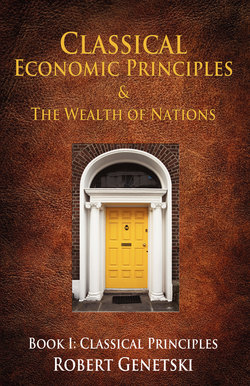Читать книгу Classical Economic Principles & the Wealth of Nations - Michael Ashley - Страница 4
На сайте Литреса книга снята с продажи.
The primary objective is to raise living standards
ОглавлениеThe primary objective of the early classical economists was to help improve living standards for the vast majority of people. Adam Smith, the most prominent classical economist, was particularly concerned with the well-being of workers and the poor.
Smith’s theories and prescriptions concerned economic growth. He knew that in order to raise living standards it was necessary to identify and promote policies that would best generate and sustain economic growth.
As with other classical economists, Smith abhorred waste and inefficiency. He did so out of concern that waste and inefficiency would undermine the living conditions of the working class and the poor.
Early advocates of classical thought saw free markets as an extension of individual freedom. They did not assume that markets were, or ever would be, perfectly free. Rather, they concluded that the more freedom people had to respond to market forces, the more efficient the economy would tend to be. And, the more efficient an economy became, the more its workers and the poor would tend to share in the benefits.
As a group, the early classical economists recognized that government was essential to any civilized society. However, they tended to distrust government, as well as powerful individuals and other established groups.
The distrust of the establishment stemmed from the classical view of human nature. These economists believed that people tend to act instinctively to further their self-interests. While the pursuit of self-interests would tend to contribute to the general welfare of all, there were exceptions. Established groups could use their money and influence to promote their self-interests at the expense of others.
So long as the government’s power and influence were limited, established interests were less likely to be able to influence its policies. However, the more powerful the government became, the more these groups could be expected to spend their time, energy and resources to promote self-serving policies. Such favoritism would be at the expense of those with less political clout, namely the middle class and the poor.
In spite of the potential to raise living standards, many view a society based on self-interest as one driven by selfish behavior. They assume that individuals pursuing their own interests will have little concern or compassion for others and that those in need would suffer. Early classical economists believed that the opposite was true. The more wealth individuals produced, the more resources would be available to help the poor.
Nothing could change the innate desire of individuals to provide first and foremost for their personal needs and those of their immediate family. However, once those needs were met, individuals had a moral obligation to help the poor and others who were less fortunate. In a free society, this moral obligation resides with each individual, not with some oppressive authority.
Early classical economists responded to this moral obligation. They often took positions based on principles. Many argued for policies they believed would benefit society, even when such policies were not consistent with their own financial interests. They gave generously and anonymously to friends and those in need.2
The belief that all men and women have God-given rights to liberty and freedom has important implications. These implications involve certain principles and policies. It is inevitable that the principles and policies that flow from God-given rights must be those that provide the greatest material well-being for the greatest number of people. God wouldn’t have it any other way.
